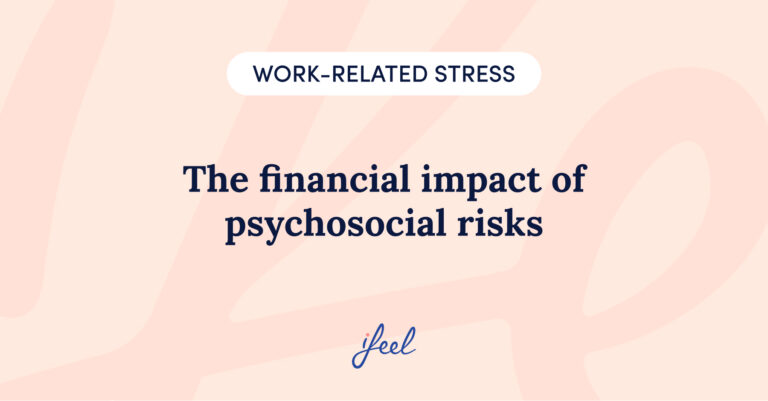In today’s fast-paced corporate world, mental health in large companies has become a crucial topic of discussion. According to the World Health Organisation, depression and anxiety alone cost the global economy an estimated $1 trillion per year in lost productivity. For large organisations, the stakes are even higher, with complex workflows and high-pressure environments exacerbating mental health challenges.
This statistic highlights the urgent need for comprehensive mental well-being solutions. By implementing robust mental health programs, large organisations can significantly enhance employee satisfaction, reduce turnover, and improve overall performance. Effective mental health solutions foster a supportive work environment and drive business success by promoting resilience, creativity, and employee engagement.
This article discusses the importance of mental health in large companies, the common mental health challenges employees face, and key benefits for employees.

Understanding mental health in large companies
Mental health in large companies refers to the emotional, psychological, and social well-being of employees within a corporate setting. It includes how employees think, feel, and behave at work, influencing their ability to manage stress, work efficiently, and interact positively with colleagues. Large workplaces face unique challenges, such as diverse employee needs, complex workflows, and high-pressure environments that can exacerbate mental health issues.
Mental health is not just the absence of mental illness but also the presence of positive attributes such as resilience, emotional intelligence, and overall job satisfaction. Recognising the full scope of mental health in large companies involves acknowledging the challenges employees face and the positive factors contributing to a healthy workforce.
Impact of poor mental health in large companies
The impact of mental health issues on employees’ personal and professional lives within companies can be profound. Here are some key areas affected:
1. Performance
- Decreased productivity: Mental health issues can diminish an employee’s ability to focus, leading to lower productivity levels.
- Poor decision-making: Stress and anxiety can cloud judgment, making it harder for employees to make sound decisions.
- Increased errors: A lack of concentration and focus can result in more mistakes, affecting the quality of work.
2. Personal well-being
- Decline in overall well-being: Mental health issues can lead to a general sense of unhappiness and dissatisfaction with life.
- Disrupted sleep: Anxiety, stress, and other mental health problems often result in poor sleep quality or insomnia.
- Poor physical health: Mental health challenges can manifest physically, leading to ailments such as headaches, fatigue, and weakened immune systems.
3. Absenteeism
- Increased Sick Leave: Employees struggling with mental health are more likely to take time off, leading to higher absenteeism rates.
- Higher Turnover Rates: Persistent mental health issues can drive employees to leave their jobs, necessitating costly recruitment and training processes for replacements.
4. Work Environment
- Negative Work Environment: Unaddressed mental health issues can create a toxic atmosphere, affecting team dynamics and overall morale.
- Reduced Team Cohesion: Stress and burnout can lead to conflicts and reduced cooperation among team members.
Understanding these impacts highlights the importance of proactively addressing mental health issues in the workplace. By recognising and mitigating these issues, companies can create a healthier, more productive work environment that benefits both employees and the organisation as a whole.

Best practices
Implementing effective mental health solutions in the workplace requires a strategic approach encompassing assessment, planning, employee involvement, and continuous education and training. Below are best practices to guide large organisations in fostering a mentally healthy work environment.
| Best Practice | Description | Key Actions |
|---|---|---|
| Assessment and Planning | Assess current mental health needs and plan appropriate interventions. | – Conduct anonymous employee surveys to identify mental health concerns. – Analyse health data and feedback to pinpoint issues. – Develop a comprehensive strategy. – Set measurable goals and define success metrics. |
| Employee Involvement | Involve employees in the development and implementation of mental health programs. | – Create a mental health task force with employee representatives. – Solicit feedback through focus groups and suggestion boxes. – Encourage employee participation in program design. – Communicate openly about initiatives. |
| Training and Education | Provide ongoing mental health education and training for employees and managers. | – Offer regular workshops and seminars on mental health awareness. – Train managers to identify and address mental health concerns. – Provide resources on stress management and resilience. – Ensure access to mental health first aid training. |
Mental health in large companies: ifeel’s key resources
Implementing a 360 well-being strategy
At ifeel, we understand the multifaceted nature of mental health in large companies and the need for a comprehensive approach. Our guide to implementing a 360 well-being strategy offers practical insights into creating a holistic mental well-being program that addresses the diverse needs of employees. This resource covers physical, mental, and emotional health and provides actionable tips and best practices for integrating well-being into your company’s culture.
By focusing on a 360-degree approach, organisations can support all areas of employee well-being, leading to a healthier, more engaged workforce. Download this essential guide to discover how large companies have successfully implemented such strategies and start enhancing your workplace wellness today.
Building a positive culture
Creating a positive workplace culture is crucial for fostering mental health in large companies. Our resource on building a positive culture provides a clear roadmap for achieving this. It emphasises the importance of a supportive environment where employees feel valued and motivated.
This guide helps set the foundation for a thriving workplace by offering strategies for promoting positive interactions, open communication, and recognising employee contributions. Highlighting the role of leadership and inclusive policies, it offers practical advice and real-world examples. Download it now to start building a culture that boosts mental well-being and overall productivity.

Trust the leaders
At ifeel, we know that mental health in large companies is a critical component of overall organisational success, driving employee well-being, productivity, and a positive work environment.
To assist in this process, our team of psychologists specialising in mental well-being has developed a mental well-being program for companies aimed at helping companies enhance employee engagement and boost productivity.
This collaboration allows HR managers to receive personalised, data-based advice on the most effective measures for detecting employee mental health issues and assessing the workplace climate. It’s the best way to understand their needs.
Moreover, ifeel’s corporate mental well-being solution offers employees a structured mental health care service tailored to their needs at any given time.
We hope you found this article on mental health in large companies interesting. If you want more information about our mental well-being solution for companies, simply request it, and we will contact your team soon.







